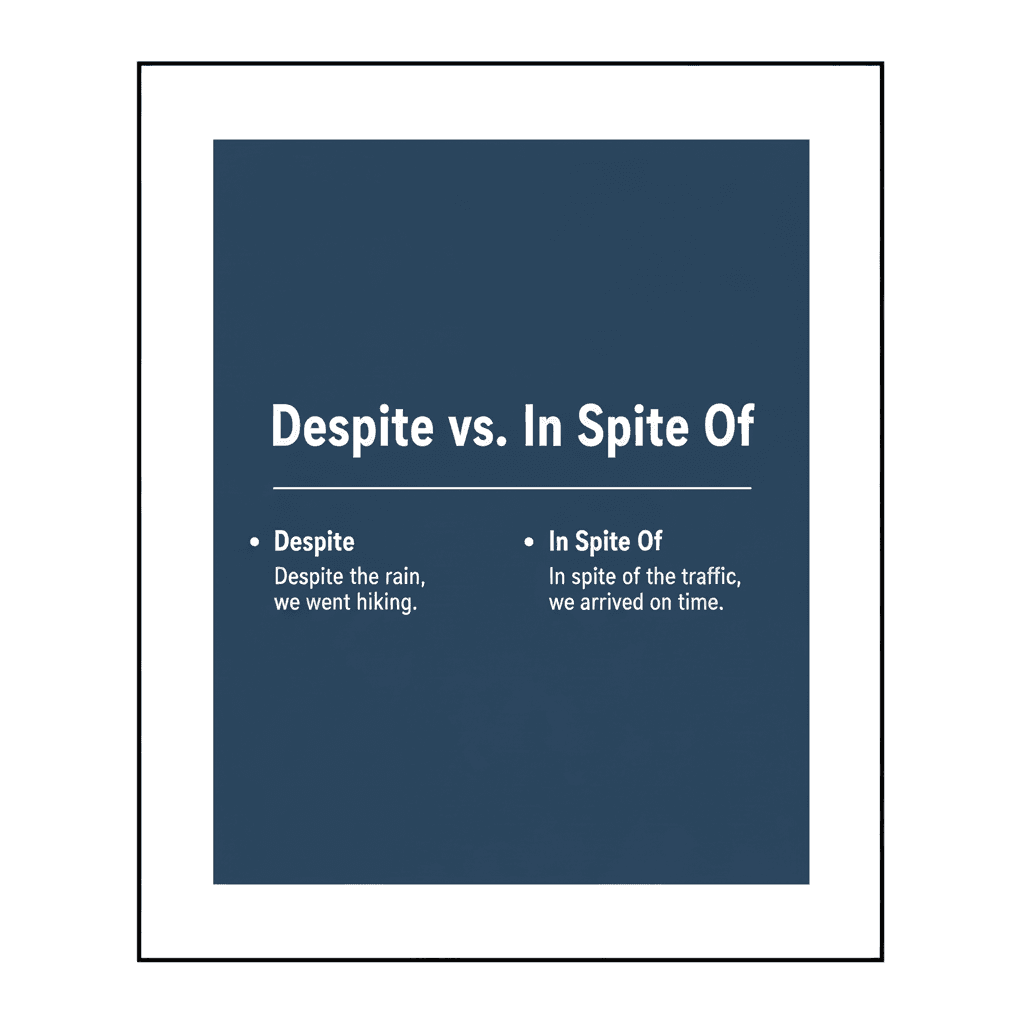Despite vs. In Spite Of: What’s the Difference?
 Despite and in spite of have the same meaning: “although” or “even though.”
Despite and in spite of have the same meaning: “although” or “even though.”
They are both correct, but despite is shorter and more common in modern writing.
Despite → ✔ one word, more formal, more common
In spite of → ✔ three-word phrase, same meaning
They are interchangeable in meaning but not always in structure.
1. Despite
Meaning
Despite is a preposition meaning even though or not affected by.
It is more compact and often preferred in formal or professional writing.
Examples (10 total)
- Despite the rain, they continued playing.
- She passed the exam despite her nerves.
- Despite the delays, the project was finished.
- He smiled despite being tired.
- Despite the traffic, she arrived on time.
- They succeeded despite the challenges.
- Despite the noise, he stayed focused.
- The team won despite an early setback.
- Despite the warning, he went ahead.
- She stayed calm despite the chaos.
🧠 Tip:
Use despite when you want a cleaner, shorter sentence.
2. In Spite Of
Meaning
In spite of has the same meaning as despite but is slightly less formal.
It also needs three words, and you must keep “of” — never drop it.
Examples (10 total)
- In spite of the rain, they continued playing.
- She passed the exam in spite of her nerves.
- In spite of the delays, the project was finished.
- He smiled in spite of being tired.
- In spite of the traffic, she arrived on time.
- They succeeded in spite of the challenges.
- In spite of the noise, he stayed focused.
- The team won in spite of an early setback.
- In spite of the warning, he went ahead.
- She stayed calm in spite of the chaos.
🧠 Tip:
If you use this phrase, always include “of”.
3. Quick Comparison Table
| Expression | Correct? | Formality | Structure | Example |
|---|---|---|---|---|
| Despite | ✔ Yes | more formal | one word | Despite the rain, we stayed outside. |
| In spite of | ✔ Yes | neutral | three words | In spite of the rain, we stayed outside. |
4. How to Remember
👉 Despite = simple (one word)
👉 In spite of = longer (three words)
Memory trick:
If you want the sentence to feel smoother, choose despite.
If you like traditional phrasing, use in spite of.
5. Common Mistakes
❌ Writing “in spite” without of
✔ Correct: in spite of
❌ Thinking “despite of” is correct
✔ Wrong — never say despite of
❌ Assuming they have different meanings
✔ They mean the same thing
Writing More Naturally
Choosing the shorter despite or the longer in spite of affects the rhythm of your writing. If you’re unsure which one reads better in context, an AI humanizer can help you refine phrasing and make your sentences sound natural and fluent.
FAQs
1. Do “despite” and “in spite of” have different meanings?
No — they mean exactly the same thing.
2. Is “despite of” correct?
No. Only despite, never despite of.
3. Which is more formal?
Despite is generally considered more formal.
4. Which one is more common?
Despite is used more often in modern writing.
Practice: Choose the Correct Phrase
(Answers are at the end.)
- __________ the heavy rain, the event continued.
- She finished the race __________ her injury.
- __________ his apology, she was still upset.
- The team won __________ the early mistake.
- He stayed positive __________ the difficulties.
- __________ the warnings, they kept hiking.
- She succeeded __________ having little experience.
- __________ his efforts, the plan didn’t work.
- The flight took off __________ the fog.
- __________ the noise, the baby slept well.
Answers
(“Despite” and “in spite of” are both acceptable — but “despite” fits better in shorter sentences.)
- Despite / In spite of
- Despite / In spite of
- Despite / In spite of
- Despite / In spite of
- Despite / In spite of
- Despite / In spite of
- Despite / In spite of
- Despite / In spite of
- Despite / In spite of
- Despite / In spite of
